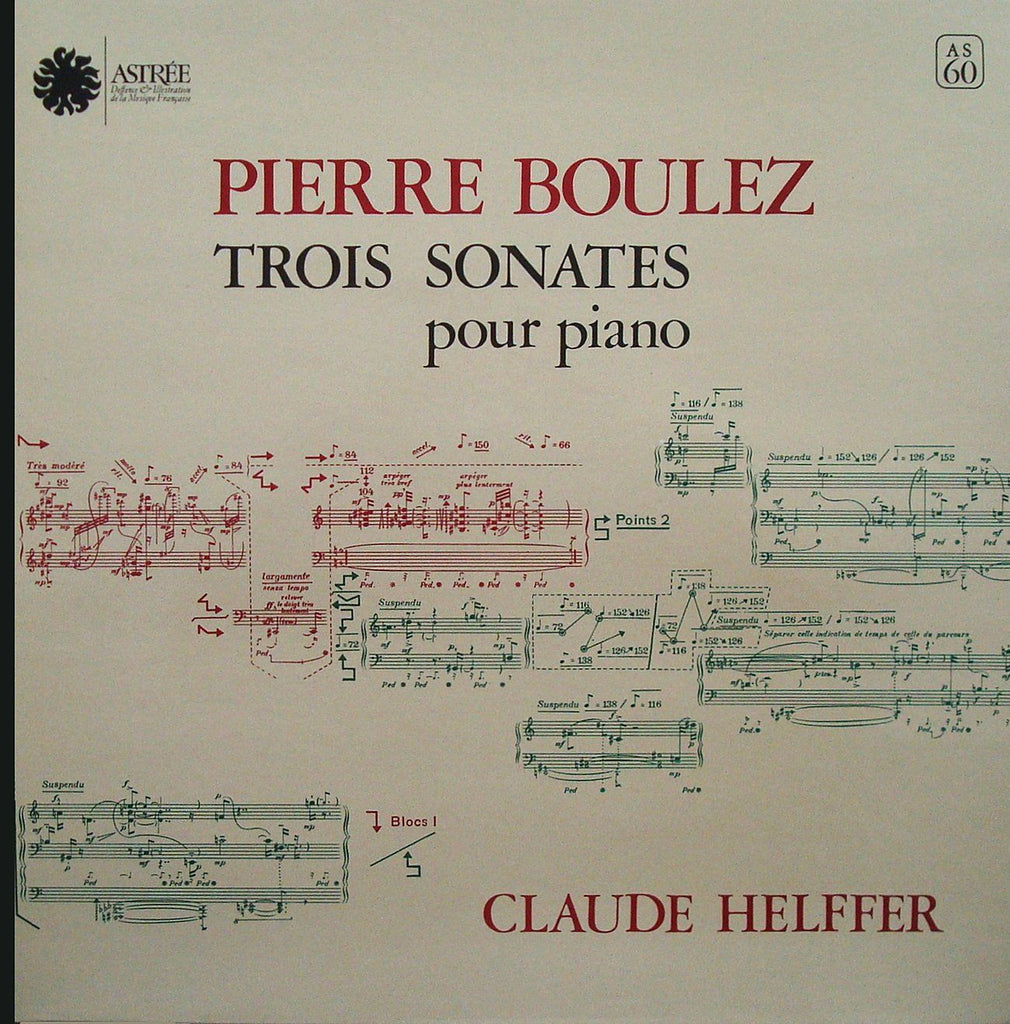Helffer: Boulez Trois Sonates pour Piano (rec. 1980) - Astrée AS 60, brilliant!
¥185.00
Jacket NM / LP NM
This beautiful gatefold LP from Astrée (AS 60, French pressing, green/silver label, stereo) features Claude Helffer’s magnificent accounts of Pierre Boulez’s 3 Piano Sonatas, all 3 recorded in the warm acoustics of the Théâtre Municipal de Vevey in July 1980.
The exact track listing, taken from Discogs, is as follows:
|
Première Sonate Pour Piano |
|||
|
A1 |
Lent |
|
4:28 |
|
A2 |
Assez Large / Rapide |
|
4:22 |
|
|
|
|
|
|
Troisième Sonate Pour Piano |
|||
|
A3 |
Formant 3 - Constellation - Miroir |
|
11:33 |
|
A4 |
Formant 2 - Tropes |
|
6:46 |
|
|
|
|
|
|
Deuxième Sonate Pour Piano |
|||
|
B1 |
Extrêmement Rapide |
|
5:42 |
|
B2 |
Lent |
|
10:23 |
|
B3 |
Modéré, Presque Vif |
|
2:08 |
|
B4 |
Vif |
|
9:34 |
Helffer was a great exponent of 20th Century music and his performances here can be spoken of in the same breath as those by Charles Rosen and, in select accounts of the individual sonatas, of Maurizio Pollini’s, et al.
Of their re-issue on Naïve critic Robert Carl for Fanfare:
“The Helffer performances are a rerelease of a 1980 recording. The three sonatas are a good journal of Boulez’s life in his early period of rigorous, serial, extreme modernism. The First of 1946 is quite miraculous: a torrent of notes, steely, mechanical, furious. Two movements, about nine minutes: the first slow with fast outbursts, the second unrelenting, with occasional pauses. A toccata for the age. The Second (1947–48) actually now sounds rather “traditional,” at least in its form. Its four movements perform the roles of their ancestors; the first movement sounds like a “first movement,” the slow movement like a “slow,” the third like a scherzo. (I can’t make the fourth sound like a rondo to my ear, though.) The language is certainly angular, violent, and abrasive, but it’s also always clear that the notes are the product of the composer’s choice , whether we agree with it or not. The Third, of a decade later (1956–57), has never been completed, with only two movements of a projected five. It involves a good deal of performer choice of how its materials are arranged, though all these elements are precisely notated. It is less directional, more “spacey,” while still being in the same modernist language. It’s impossible to hear the differences between realizations without having multiple versions at hand, and even then I’m not sure one will distinguish much variety without careful study and repeat listenings. Strangely, while conceptually the “radical” of the three, it seems to me the most conventional in its sound and practice.”
This album was produced by Michael Bernstein and engineered by Dr. Benjamin Bernfeld.
The striking cover design was executed by Atelier CLD, Chambrey-lès-Tours and the interior panels of the gatefold jacket contain superlative liner notes by Dominique Jameux, printed in French only.
